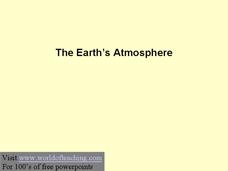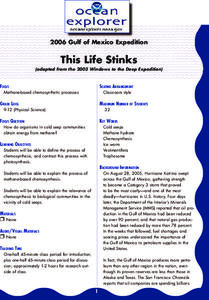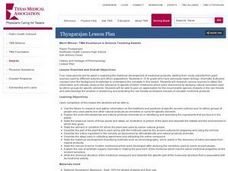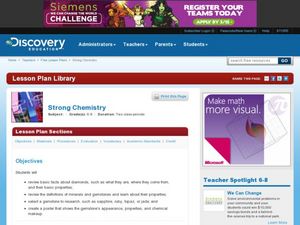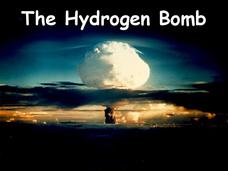Curated OER
Earth's Atmosphere
This simple presentation sports a timeline of the last 400 million years. Click by click, the condition and developments in Earth's atmosphere appear along the timeline. This is a nifty PowerPoint that you could use as you teach about...
Curated OER
Periodic History
Students gain a perspective in the development of chemistry. They understand some of the topics in their text and the ongoing nature of research. They then will be able to see the trends of the periodic table first hand through their own...
Curated OER
Advertise Your Family
In this periodic table worksheet, students create an advertisement for a chemical group or family they are assigned. They need to include topics such as are the elements solids, liquids or gases at room temperature, the history of the...
Curated OER
Polymers
Present polymers to your chemistry class with this practical PowerPoint. Begin with a definition and the properties of polymer materials. Branch out into diagrams of polymer structure. Consider the two general types: addition polymers...
Curated OER
The Thermite Reaction
Searching for a way to take your chemistry class to the next level? Provide pupils with an exciting and educational experiment demonstrating the thermite reaction! The mixture of aluminum powder and iron oxide allows young chemists to...
Curated OER
The Periodic Table
A huge collection of slides introduces chemistry learners to the periodic table of elements, electron configuration, and electronegativity. It opens with the history of today's periodic table, and then details the arrangement. After...
Curated OER
Selected Elements
This collection consists of a slide on each of the following unrelated, but fascinating elements: einsteinium, curium, radium, radon, nobelium, seaborgium, silicon, magnesium, and postassium. You will not find detailed information on the...
Curated OER
Ice Cream
Open this instructional activity by giving a brief history of ice cream. Using liquid nitrogen to lower the temperature, preteens make their own confection. The accompanying activity sheet queries learners about freezing point, the...
Curated OER
This Life Stinks
Chemosynthetic communities of cold seep areas are considered in this lesson. Working in collaborative groups, marine biology or oceanography learners research and prepare a report about oxidation-reduction reactions involved with...
Curated OER
The Gas Laws
A couple of gas law charts and the history of the gas laws constitute this presentation. Notes are included for the slide that illustrates how to perform gas law calculations. This is a simple collection, a visual aid enhance to your...
Curated OER
History of Atomic Theory
Students study the significance of the quantum model and how scientific theories adapt over time. In this investigative lesson students describe the contributions that scientists have helped develop the atomic theory and identify...
Curated OER
History and Heritage of Pharmacology
Twelfth graders research various sources to obtain the information and critically analyze the relevance to specific modern medicines which were discovered by studying natural remedies used by ethnic groups for specific ailments.
Curated OER
Strong Chemistry
Students research and create a poster about a gemstone. In this mineral properties lesson, students view a video about diamonds. They discuss the properties of minerals and choose a gemstone to research and create a poster.
Pingry School
Gas Pressure and Volume Relationship
Do your high school scientists know the four methods scientists use to communicate information? A simple experiment discovering the relationship between gas pressure and volume allows pupils to practice all four. After completing the...
Science Geek
The Hydrogen Bomb
Recycled Russian nuclear weapons provide 10 percent of the nuclear energy that the United States uses. The short presentation discusses the Teller-Ulam device. It provides a diagram of the parts as well as a description of the four...
Virginia Department of Education
Atomic Structure: Elements
It's all relevant, really. Individuals use the scientific method to learn more about elements, atoms, and their placement on the periodic table. They conduct experiments using materials common in nature to explore how elements affect our...
Curated OER
Nuclear Reactions Answers to Questions
Written to accompany another slide show available through our site, the information here gives the history and trivia connected to nuclear decay research. This slide show concentrates on the definitions and theory of nuclear fission and...
Curated OER
Anatomy of an Element
Learners discuss matter and atoms using this resource. First, they look at a website describing atoms. Then, they learn about the periodic table and discuss how it is organized. Finally, they create a comic strip to display their...
Curated OER
The Mole
This compact collection of slides explains the history and use of the mole unit. Relative atomic mass, as John Dalton understood it, is explained. Avogadro's number is also introduced. The mole, or the unit for the amount of a substance,...
NOAA
I Can't Breathe!
The Gulf of Mexico dead zone, an area of low oxygen that kills marine life, costs the United States $82 million every year. Young scientists research anoxic ocean environments then come up with a hypothesis for the cause of the Gulf of...
Curated OER
CEENBot Soccer
Young scholars research the history and uses of the different elements in the periodic table. In this chemistry lesson, students explain the significance of an element's valence electrons. They create a multimedia presentation of an...
Curated OER
Beat the Greeks
Students conduct research of the history of atomic theory. Information is presented from Democritus and Aristotle to the early Renaissance using the Internet and video.The integration of technology allows for a vast amount of research...
Curated OER
Calculating the Average Mass of the Newly Discovered Element: Bean
Students determine the average mass of a new element using masses from three isotopes. In this chemistry lesson, students explain what an isotope is. They discuss their importance and uses.
Curated OER
How Can You Study Things You Can’t See Like: Atoms?
Students simulate how scientists studied things they can't see like atoms. For this chemistry lesson, students predict what is inside the numbered obsertainers. They design a way to investigate what's inside without opening it.


